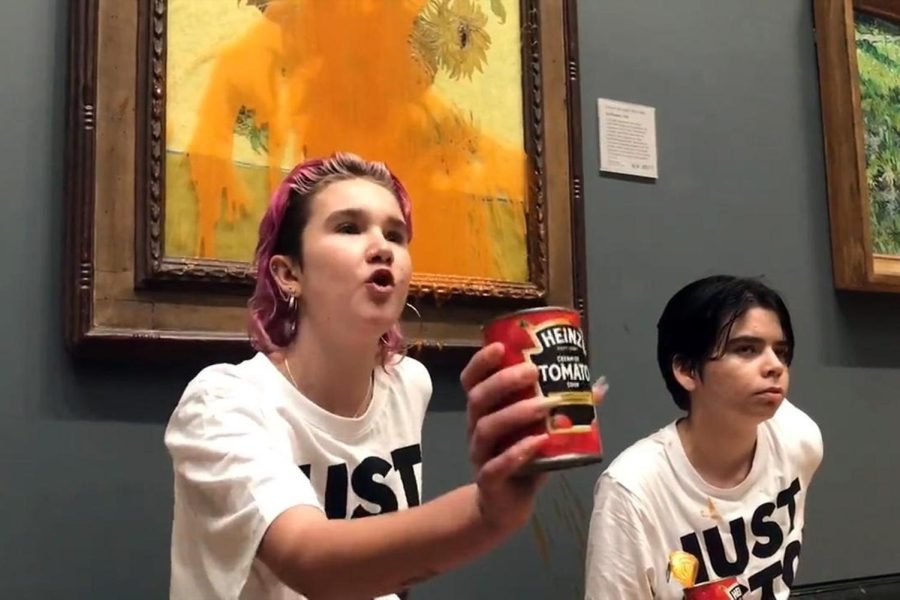Opinion: Art should not be destroyed to make a point
An incident involving tomato soup and one of the world’s most precious paintings reminds that destroying culture to make a point hurts more in the end
Just Stop Oil / Zuma Press / TNS
Just Stop Oil protesters glued themselves to the wall and then threw tomato soup at Vincent Van Gogh’s iconic 1888-9 art work ‘Sunflowers,’ at the National Gallery on Oct. 14, 2022, in London.
November 1, 2022
On the morning of October 14th, two climate activists from the “Just Stop Oil” organization, an organization against large oil conglomerates, protested by throwing tomato soup on the famous “Sunflowers” painting by Vincent Van Gogh in the National Gallery of London, before then gluing themselves to the wall. Museum staff immediately called security on the two protesters, and the pair was arrested. A viral video of this act depicts bystanders yelling in shock, and even disgust, and the attempted destruction of the painting has sparked serious controversy.
Should art of before be a victim of activism now? I don’t think so. Art, specifically the one targeted in the video, has nothing to do with big oil companies or climate change. The action of attacking the painting in protest damages the movement by making “Just Stop Oil” look unreasonable and draws attention away from the bigger issue.
“Just Stop Oil” was launched in the UK in February of this year with the goal of ensuring that the government halts use of fossil fuels, as it generates carbon emissions and worsens global warming. The recent protest is not the first of its kind, as the organization has been involved in protests involving gluing themselves to paintings, blocking roads, and even racetracks.
Why did “Just Stop Oil” attack the Van Gogh painting? The recording having since gone viral signifies that this could’ve been an attempt to gain visibility, however, this act comes off as misguided. Van Gogh has nothing to do with big oil companies. The attack on the painting is completely unwarranted.
The misplaced nature of the protest also makes the organization itself look bad. The drama caused by it has given a lot of negative attention to “Just Stop Oil” and the attack on a seemingly random target makes the movement come off as rash. Climate change and big oil companies are a huge issue, but this feels like fighting fire with fire, and is counterproductive.
The negative reaction doesn’t only affect the organization itself, either. Inflating oil prices have caused inflation in food prices, and thus a famine has started in Europe — yet, this publicity stunt has gotten more media coverage. David Beasley, head of the United Nations World Food Program said “a record 345 million acutely hungry people are marching to the brink of starvation.” The protest against oil companies is taking much needed attention away from the bigger climate crisis, control oil companies have, and the problems that stem from it, and because of this, is hurting the cause.
The destruction of art is not only immoral but also is counterproductive to the important fight against global warming. While the painting, that was thankfully covered in glass, goes unharmed, the damage done to the movement against climate change may be irreversible.











